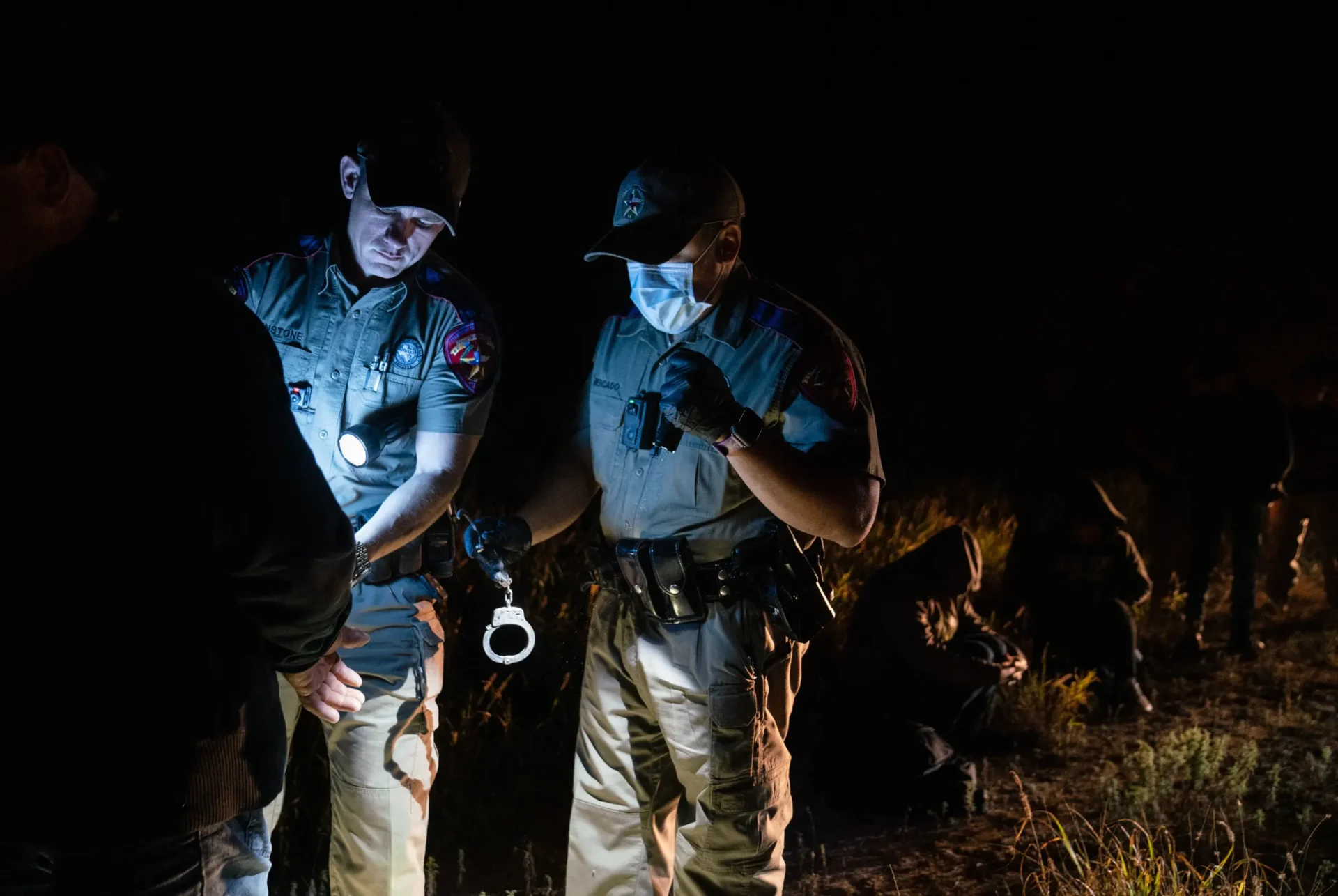Judge In Texas Border Crackdown Accused Of Using Racist Slur Against Migrants

State Troopers arrest an undocumented Mexican migrant for trespassing on Nov. 9 as part of Operation Lone Star after he was caught with others on private property in Kinney County. Credit: Verónica G. Cárdenas for ProPublica/The Texas Tribune
By Jolie McCullough, The Texas Tribune
Editor’s note: This story contains explicit language.
A prominent judge in Texas Gov. Greg Abbott’s border security operation to arrest and jail migrants on trespassing charges has been accused of using a racist slur against Latino defendants.
A defense attorney told the State Commission on Judicial Conduct last week that Judge Allen Amos told her the trespassing defendants weren’t “your regular wetbacks,” according to a copy of the complaint obtained by The Texas Tribune.
“They have phones and clothes and all kinds of other things,” Amos reportedly said in July to defense attorney Emily Miller, whose complaint was first reported by The Daily Beast.
Miller is asking the commission to consider whether Amos’ alleged comment violates the Texas Judicial Code of Conduct. On Monday, Amos told the Tribune he would not comment on the complaint but would “have to wait for the judicial ethics people.”
It’s unknown if he will continue serving as a visiting judge for migrant trespassing cases in the meantime.
[Texas’ border operation is meant to stop cartels and smugglers. More often, it arrests migrants for misdemeanor trespassing.]
Aside from being racist, Miller told the commission she interpreted Amos’ comment to mean he believed the migrant defendants weren’t poor, potentially influencing his bond decisions for men held in a state prison on low-level misdemeanor charges.
“I have had several indigent clients of Guatemalan, Honduran, and Mexican descent whose bonds have recently been revoked by Judge Amos, and his presumed bias against my clients by calling them ‘wetbacks’ and mentioning their supposed affluence leads me to question whether he made an unbiased decision in their hearings,” she wrote in her complaint.
Amos has often refused to lower bond amounts for migrant trespassing defendants. In December, he told one man, who had been imprisoned for more than 100 days and could not afford to post bond to be released and sent back to Mexico, that the $2,500 in cash the migrant would have to front was “not that much money.”
A former Concho County judge, 80-year-old Amos was tapped by the Kinney County judge to oversee a large group of the migrant trespassing cases in the county that has most zealously prosecuted them. Kinney County, a rural border county with conservative leadership, has imprisoned thousands of men on trespassing charges under Abbott’s border security initiative, Operation Lone Star.
[Hundreds of migrants accused of trespassing languish in Texas prisons. A county judge’s new approach might prolong their detention.]
The county’s leaders are staunchly conservative, labeling the immigration crisis an invasion and often publicly slamming President Joe Biden’s immigration policies. The county’s government website prominently links to a “defend our borders” fundraising site featuring the county judge, sheriff and misdemeanor prosecutor. The previously sleepy region has reported more break-ins with the increase in immigration, and state police often speed through town chasing suspected smugglers.
Last summer, the Republican governor flooded several border counties with state police to arrest and imprison single male migrants for allegedly trespassing on private property in an effort to push back against a sharp rise in illegal immigration. The number of people crossing the border, many of whom are seeking asylum, has continued at record levels.
The arrest practice has been marred by controversy from the start. Continual mistakes by police, prosecutors and judges led to wrongful arrests and hundreds of men being illegally imprisoned, in violation of state due-process laws. The U.S. Department of Justice is investigating the trespassing arrest initiative after complaints of discriminatory arrest practices.
After their arrests in Kinney County, migrants have spent weeks or months in state prisons converted into jails for immigration-related crimes. Those men are unable to post bond to be released — typically to be deported — before they can get before a judge to plead guilty or ask for a reduced bond in the backlogged courts.
Originally, the region’s administrative judge, Stephen Ables, had assigned three visiting judges — two Republicans and a Democrat — to help the county, which has only one misdemeanor judge and prosecutor and is used to handling dozens of cases a year, not thousands. But in December, Kinney County Judge Tully Shahan dismissed the three judges and asked Ables to instead assign five that he selected, including Amos, Ables told the Tribune at the time.
Shahan did not respond to questions Monday from the Tribune on whether he would call for Amos’ removal from his county’s bench. Ables’ office said he could not be reached because he is on vacation.
Shahan has previously argued that the decision to remove and reassign judges was up to Ables.

